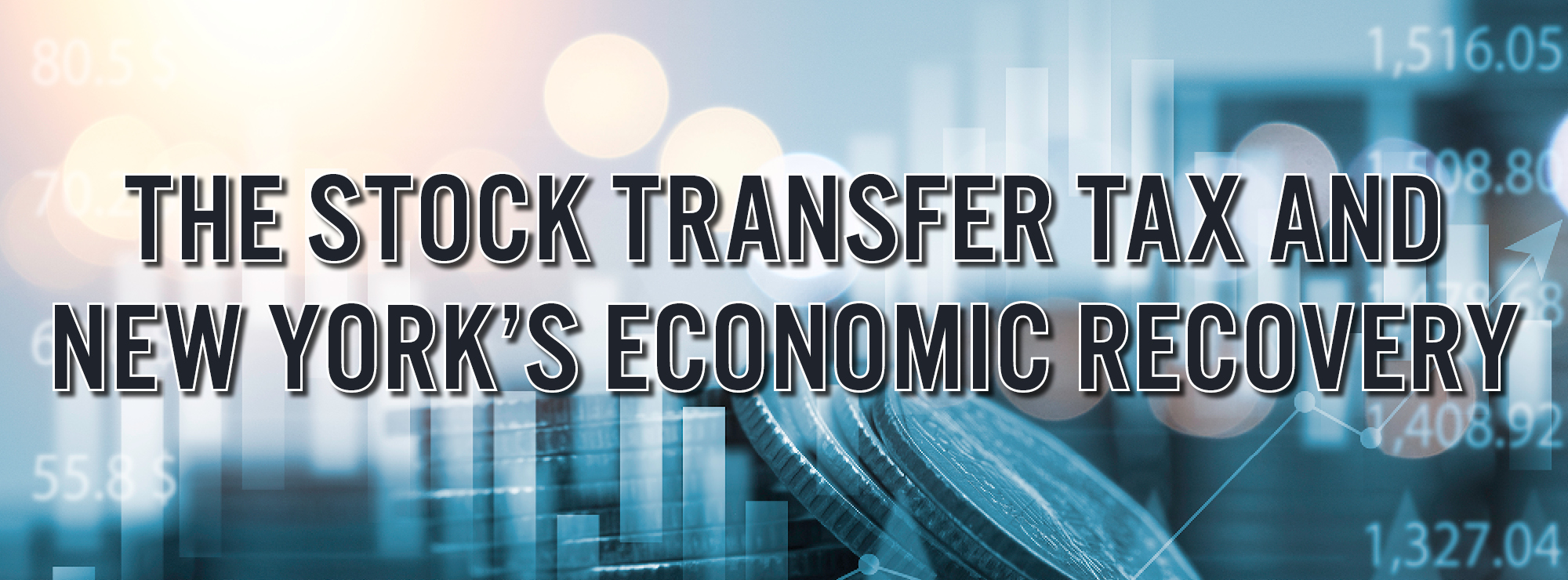
Background
- New York’s Stock Transfer Tax has been levied on stock trades since 1905
- Since 1981, the tax has been rebated back to Wall Street firms
- If fully collected, the Stock Transfer Tax is estimated to raise up to $14 billion or more annually. See footnote 3.
- NYS Assemblymember Steck and Senator Sanders have introduced legislation to require the state to keep the proceeds from this tax (A3353/S1406)
- On August 25th Assemblymember Steck convened a panel of experts to discuss the proposal: Joseph Stiglitz, Robert Pollin, James Henry, and Zephyr Teachout
Panel of Experts:
In August, New York State Assemblymember Steck convened a public event consisting of experts to discuss New York State’s Stock Transfer Tax. The panel included: Joseph Stiglitz, a Nobel Prize Nobel prize winning economist, former chief economist of the World Bank, Professor at Columbia University; Robert Pollin, Professor of Economics at University of Massachusetts, author of a study on the STT commissioned by the New York State Assembly; James Henry, Former Chief Economist at McKinsey & Co., Global Justice Fellow at Yale University, Senior Advisor to the Tax Justice Network; and, Zephyr Teachout, Professor of Law at Fordham University. The panel concluded that New York State is justified to retain the revenues from the tax for both financial and economic fairness grounds. This fact sheet highlights their comments.
Video of the event can be accessed here.
Myth Vs. Fact
Myth 1: If the Tax is collected, Wall Street will leave the state
-
Fact: The NYSE never relocated while the Stock Transfer Tax was collected in New York from 1905-1981 and already has lower transaction fees than other markets
- After the tax was instituted in 1905, other exchanges in the United States, which did not have the tax, closed, and trading migrated to NY
- Goldman Sachs recently said this when Hong Kong increased its tax to 13 cents per $100: “The overall increase, it sounds like 30%’s a big number, but it’s really 3 cents on every hundred dollars of trading – that’s hardly gonna be a sufficient fundamental reason for people to make an investment decision.”1
- STT at 5 cents per share is less than what Hong Kong charges for average trades
Myth 2: Collecting the Stock Transfer Tax will financially harm the state’s pension funds
-
Fact: The vast majority of trades are high frequency trades and are not the typical trading activities that occur in pension investments.
- “...80% of trades are fast trades, high frequency trades, the kind that are reversed in minutes...basically a market as a casino” (Pollin, 21:30)
- The NYS Teachers Retirement System and the NYS State and Local retirement system pay $1.3 billion per year to Wall Street firms for returns of 2% or less. STT would be only 3% of that amount and could easily be absorbed without affecting plan returns
Myth 3: The NYSE can switch to “the cloud” to electronically evade the tax
-
Fact: In 2018 a Supreme Court decision allowed for state sales tax to be collected on internet sales in other states. This has been successful both on tangible products and in-tangible products, such as streaming services.
- “People still think of the cloud in some ways as unreachable but perhaps the best example of something that is concrete that relates to this is Chicago has an amusement tax that extends to Netflix streaming and after the Wayfair decision everyone understands that this tax is not a problem...it [the tax] is collectable...and the stock transfer tax falls squarely in this decision.” (Teachout, 32:26)
Long Standing Tax
Enacted in 1905, New York State’s stock transfer tax (STT) is an excise tax levied on stock trades. The STT taxes each sale of stock worth over $20 at 5 cents.2 While this small fee amounts to a tiny cost on each transaction for investors, the revenue gains for New York State would be tremendous. Some estimate the tax, if fully collected, could raise billions of dollars annually in new revenue. Since it has been fully and automatically rebated to Wall Street since 1981, New York State has lost billions in revenue. Just in the past 10 years, New York State rebated back well over $100 billion.3 Though the tax collected on an average NADAQ trade would be only $8.80 (lower than under the method used in Hong Kong), it is the volume and frequency of trades that generates the revenues.
- “This is a particularly germane time to be talking about this, because we will be needing enormous amounts of revenues. The COVID-19 is resulting in marked decreases in tax revenues, in all the states, New York included. So, we will have no choice by to raise taxes or cut back expenditures; and cutting back expenditures will have, if all the states do it, significant macro-economic consequences.” (Stiglitz, 7:07)
For most investors, this is an unseen tax --even if it were collected. Most people who have investments generally are not buying and selling stocks with great frequency. Wall Street speculators, on the other hand, seek to jump in and out of investments at a rapid pace and those would be the people who would pay the vast bulk of the tax.
- “If you look at the heaviest trading days since the year 2000, 75% of them were in the year 2020...we’ve had daily volumes escalating dramatically during this period, this year we saw an 85% increase in Dow volumes.” (Henry, 46:41)
Around the World
There are already places with sophisticated stock markets that have a stock transfer tax in place as a revenue stream. Countries like the United Kingdom, Switzerland, and Taiwan all have financial transaction taxes on the books. Hong Kong, a city considered to have the freest economy in the world, has a 0.1% tax on financial transactions with no significant impact on its economy aside from a lack of high-frequency trading.4
- “This is the ideal time we should be aggressively advocating for this kind of tax, because the standard tax competition argument [that] they’re [NYSE] going to move to New Jersey, they’re going to go to Chicago, they’re going to go to London, or they’re going to Frankfurt, doesn’t apply when you have every major country in the world facing massive budget deficits as far as the eye can see.” (Henry, 24:07)
No need to complicate the Matter by Taxing Bonds and Derivatives
Some advocates want to tax bonds and derivatives. This was prompted by a concern that STT would not raise enough money, due to inaccurate reporting by Wall Street firms. See footnote 3. Since NY has 50% of all trading in the world, we do not need to tax other securities to raise massive revenue. Further, taxing stock trades will not result in purchasers buying bonds and derivatives instead of stocks. As Goldman Sachs has said, taxing trades at an exceedingly low rate does not influence investor behavior. Those who are interested in the benefits of equities will buy equities; those who are interested in greater security provided by bonds will buy bonds; those who interested in the risks of derivatives will purchase derivatives. Further, bonds and derivatives are future oriented, so taxing them properly is more complex. They properly should be valued to be taxed. This violates the principle of keeping it simple.
A popular proposal
A recent Zogby poll found that a majority of New Yorkers want to revive the Stock Transfer Tax and support increases to over 60% when the money is dedicated to infrastructure as the Steck/Sanders bill does. Even 77% of workers in the financial industry supported reviving the tax.5 New York State infrastructure has a C- rating and is badly in need of improvement.6 Further STT will inject billions of dollars into the economy of Upstate NY which has been in decline.
Articles Written By Steck:
Why firms/computers will not move to New Jersey (or elsewhere) to avoid STT
Why the Stock Transfer Tax (STT) does not affect your pension
Quick Facts about the Stock Transfer Tax
News Articles on the Stock Transfer Tax
Wall Street can spare a nickel-New York should reinstate the Stock Transfer Tax By TOM ALLON DECEMBER 21, 2020
